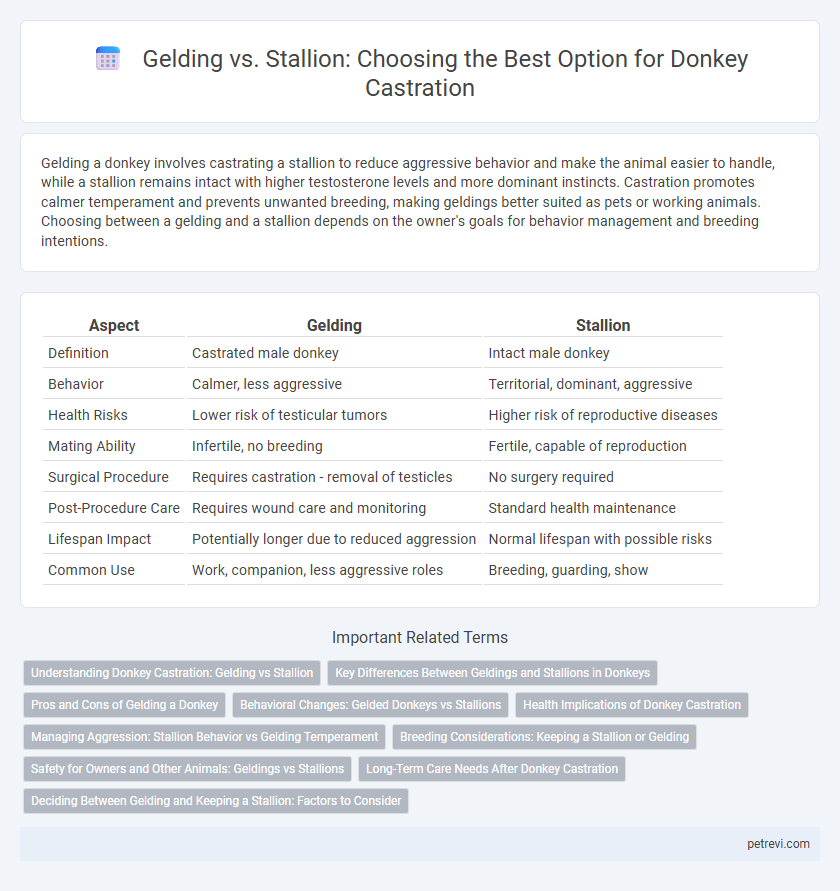Gelding a donkey involves castrating a stallion to reduce aggressive behavior and make the animal easier to handle, while a stallion remains intact with higher testosterone levels and more dominant instincts. Castration promotes calmer temperament and prevents unwanted breeding, making geldings better suited as pets or working animals. Choosing between a gelding and a stallion depends on the owner's goals for behavior management and breeding intentions.
Table of Comparison
| Aspect | Gelding | Stallion |
|---|---|---|
| Definition | Castrated male donkey | Intact male donkey |
| Behavior | Calmer, less aggressive | Territorial, dominant, aggressive |
| Health Risks | Lower risk of testicular tumors | Higher risk of reproductive diseases |
| Mating Ability | Infertile, no breeding | Fertile, capable of reproduction |
| Surgical Procedure | Requires castration - removal of testicles | No surgery required |
| Post-Procedure Care | Requires wound care and monitoring | Standard health maintenance |
| Lifespan Impact | Potentially longer due to reduced aggression | Normal lifespan with possible risks |
| Common Use | Work, companion, less aggressive roles | Breeding, guarding, show |
Understanding Donkey Castration: Gelding vs Stallion
Donkey castration involves removing the testes of a stallion to create a gelding, which helps control aggressive behavior and reduces the risk of unwanted breeding. Stallions retain their reproductive capabilities and often exhibit more dominant and territorial behaviors compared to geldings. Understanding these behavioral and physiological differences is crucial for selecting the appropriate castration approach to ensure the donkey's health and manageability.
Key Differences Between Geldings and Stallions in Donkeys
Geldings are castrated male donkeys resulting in reduced testosterone levels, leading to calmer behavior and decreased aggression compared to intact stallions. Stallions retain their reproductive capabilities and exhibit stronger territorial instincts and dominance behaviors, which can complicate handling and management. Castration transforms stallions into geldings, improving docility and often enhancing suitability for work or companionship.
Pros and Cons of Gelding a Donkey
Gelding a donkey reduces aggressive behaviors and decreases the risk of injury, making them easier to handle and safer around people and other animals. Geldings typically have calmer temperaments and fewer territorial disputes compared to stallions, which improves their suitability for work or companionship. However, gelding is an irreversible procedure, and the removal of testosterone can impact muscle development and may reduce their ability to breed, limiting genetic contributions.
Behavioral Changes: Gelded Donkeys vs Stallions
Gelded donkeys typically exhibit calmer and more predictable behavior compared to stallions, as castration reduces testosterone-driven aggression and territorial tendencies. Stallions often display dominant and sometimes aggressive behaviors, including increased vocalization and mounting, which can cause management challenges. Castration promotes a more docile temperament, making geldings easier to handle and suitable for various work or companion roles.
Health Implications of Donkey Castration
Gelding a donkey reduces the risk of aggressive behavior and testicular diseases such as tumors and infections, promoting calmer demeanor and improved safety for handlers. Stallions, on the other hand, are more prone to prostate issues, contraceptive complications, and higher incidence of injuries due to territorial aggression. Castration lowers the likelihood of reproductive cancers and helps prevent unwanted breeding, contributing to overall herd health and management efficiency.
Managing Aggression: Stallion Behavior vs Gelding Temperament
Stallions exhibit higher levels of aggression due to elevated testosterone, requiring careful handling and secure facilities to prevent injuries during castration. Gelding donkeys reduces testosterone-driven behaviors, resulting in a calmer, more manageable temperament suitable for work and companionship. Proper castration management improves safety for handlers and decreases aggressive encounters among donkeys in shared environments.
Breeding Considerations: Keeping a Stallion or Gelding
Choosing between a gelding and a stallion greatly impacts donkey breeding strategies, as stallions retain reproductive abilities essential for controlled breeding programs and genetic diversity. Geldings, being castrated males, eliminate risks of unwanted pregnancies and aggressive behaviors, making them ideal for managing herd dynamics without breeding concerns. Breeders must weigh the benefits of preserving a stallion's breeding potential against the safety and management advantages provided by gelding.
Safety for Owners and Other Animals: Geldings vs Stallions
Gelding donkeys pose significantly lower risks to owners and other animals due to their reduced aggressive behavior and decreased hormonal-driven territoriality compared to stallions. Stallions exhibit heightened aggression and unpredictable reactions during handling and group interactions, increasing the potential for injuries. Choosing gelding over stallion castration enhances overall safety by minimizing biting, kicking, and fighting incidents in donkey management environments.
Long-Term Care Needs After Donkey Castration
Geldings require consistent long-term care including regular hoof trimming, dental checks, and monitoring for potential behavioral changes to ensure optimal health after castration. Stallions, if left intact, demand intensive management to control aggressive behavior and reproductive instincts, increasing the daily care workload compared to geldings. Post-castration, donkeys benefit from a balanced diet and stress-reduction practices that support healing and maintain overall wellness.
Deciding Between Gelding and Keeping a Stallion: Factors to Consider
When deciding between gelding and keeping a stallion for a donkey, factors such as temperament, intended use, and management ease play crucial roles. Gelding generally results in calmer behavior, reduced aggression, and easier handling, which is beneficial for working or companion donkeys. Stallions may be preferred for breeding purposes or preserving lineage but require experienced management to mitigate dominance and territorial behaviors.
Gelding vs Stallion for Donkey Castration Infographic

 petrevi.com
petrevi.com